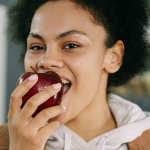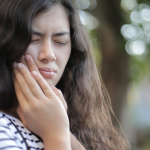Since dental clinics will remain closed for the foreseeable future, lots of people are going to be missing out on their routine checkups. Regular exams and cleanings are essential in maintaining optimal oral health, but here’s what you can do to tide yourself over if your next trip to the dentist has been postponed.
Don’t forget your oral hygiene basics
As always, you should focus on maintaining good oral hygiene habits even if your typical daily structure has been upended. Brushing twice a day and flossing daily make for the most obvious and critical routine to avoid plaque buildup, but it’s also one that many people tend to either rush through or even partially ignore.Â
Many have a tendency to skip flossing for days or even weeks at a time, but it’s now more important than ever to make it a part of your daily life. Even those who do floss regularly don’t always follow the proper technique, tending to speed up the process a bit too much; instead of snapping or forcing the floss, be sure to slide it gently up-and-down between your teeth, curving it around the tooth’s base to reach under the gumline. This not only gives your gums a well-rounded cleaning, but also helps to reduce swelling and bleeding.Â
Tongue scrapers can be an added bonus
You can also consider adding a tongue scraper to your routine, as the tongue is another oft-neglected area of people’s hygiene habits. Tongue scrapers clean the tongue more effectively than a toothbrush, ably removing a great deal of dead skin cells, bacteria, and food debris, which can help fight bad breath and leave the mouth feeling cleaner.
Watch what you eat
Your diet can also have a significant impact on your oral health. While in self-isolation, it’s understandably tempting to indulge in snacks and sweets as a way to deal with stress and boredom, but you definitely don’t want to overindulge to the point of damaging your teeth. Consider limiting your intake of starchy snacks like chips and bread or sugary ones like soft drinks and candy to avoid tooth-dissolving acids. When you do eat them, make sure to rinse your mouth right after your meal to protect your enamel.
If you’ve got a sweet tooth, check out last year’s Easter blog detailing the effects different kinds of treats can have on your oral health. For foods that are actually beneficial for your teeth, high-fibre fruits and veggies are the way to go, as are foods that are rich in protein, calcium, vitamin D, etc.
Be sure to stay healthy and safe!






